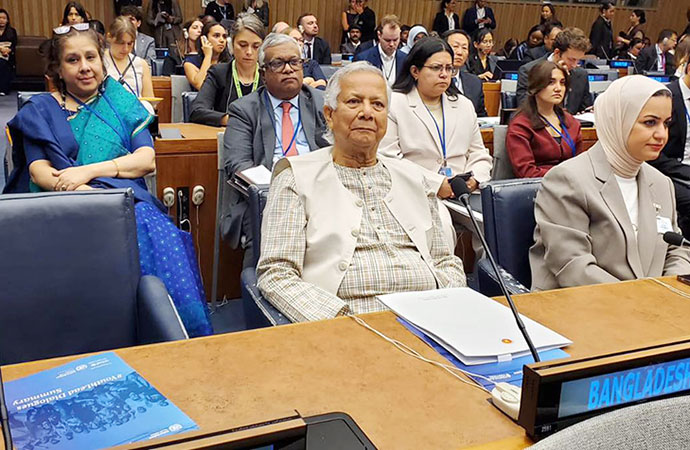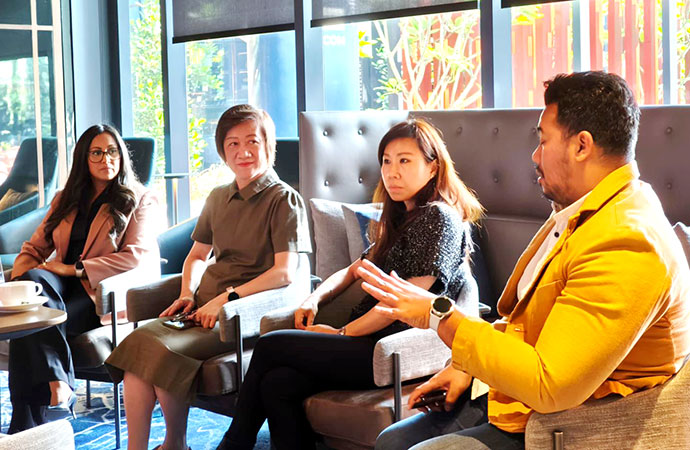Reportage

Chief Adviser Dr. Muhammad Yunus
As Muhammad Yunus makes his way through yet another jam-packed day UNGA80, it would seem almost lost on him, even at the age of 85, that he can afford to take it easy. That no, he doesn't have to push himself so hard at the UN's global summit, to try and make the best of his time, to make every second count. This will be his second, and he insists - last appearance at the UNGA as the head of a country delegation. But that isn't slowing him down a bit.
Last year, it was at UNGA79 that Yunus seemed to come into his own as the leader of his nation, having taken the reins in exceptionally volatile circumstances that demanded a steady hand at the helm, who could present the story of a generation's monumental awakening, that had overthrown a leader who had long gone rogue and hijacked the country's democracy, but was known for skilfully whitewashing her transgressions at events such as UNGA.
Bangladesh's unique geography as a frontier state in the fight against climate change, or the rapid social progress achieved by its armies of working women, or even the overtly humane gesture for which she expected a call from the Nobel committee that never came, by opening the border to the fleeing Rohingya population that was facing an ethnic cleansing campaign by the Myanmar army in August 2017 - all of this was enough to keep her in the limelight at these global events, so that her countrymen had to overlook some of her and her party's worst crimes on the domestic front.
Yunus of course inherited much of this following Hasina's stunning ouster last year, by the student-led mass uprising whose leaders, all in their mid-20s and having caused one of the most transformative events in the region's history, chose to ask the 84-year-old Nobel laureate, then in Paris for its Olympics (he was involved in its 'design' through his good friend Mayor Ane Hidalgo), to come back and take the reins. By the time he came back and did so, the country had plunged into a vacuum where all posts of civilian authority had been hollowed out by the act of the Awami League literally fleeing - till the very end, each one of them taking their cue from their leader.
Yunus came in and was confronted, first of all, by the absence of law and order, thanks to an absent enforcement agency: the police had left their posts. They slowly came back, but a lot of the police's work has been done over the last 14 months or so now, by the Army, and that fatigue is now clearly setting in.
It wasn't until he came to New York, that Bangladeshis really saw what they had gained from the call made by the students. Whereas Hasina would make perfunctory appearances at the forums related to the issues discussed earlier, maybe snag a meeting or two on the sidelines - a photo op with Prime Minister Narendra Modi, could always be relied upon - and the rest of the time, stay in her room mostly. At one stage she would devote an afternoon or two to events hosted by the Bangladesh community in America, or the US branch of AL.
Yet even as members of the press team accompanying him, including UNB diplomatic correspondent A.K. Moinuddin, can testify, covering him for the first time last year was a revelation. At the same time, it was stressful, and on some days the press corps ended up with 18-20 hour working days by the time the last item of the day was released. Despite the hard work and the toll it took on some, what no one could deny was the sheer adrenaline that kept them going, perhaps inspired by their untiring boss.
Some people raise eyebrows at the large contingent accompanying the CA from his press office, but Moinuddin says every one of them, including Press Secretary Shafiqul Alam, who left his job as the Dhaka bureau chief for AFP to join the Yunus administration, was busy throughout, without a minute to spare. The amount of meetings and sideline events they have to cover means no one gets a free ride.
"If anything, they could use another hand to be honest," was Moin's assessment after returning from UNGA79, for which the CA had spent four days in New York, and participated in over 50 engagements, with the highest number in a day being 16 events on September 26, 2024.
This year won't be much different, if the start is anything to go by.
Within hours of his arrival at New York's JFK International Airport, the Chief Adviser had met the Prime Minister of Australia, Queen Máxima of the Netherlands, the Director-General of the World Health Organization, the former President of Chile, and the current Foreign Minister of Uruguay.
Queen Máxima also serves as the UN Secretary-General's Special Advocate for Inclusive Finance for Development. Her Royal Highness Catharina-Amalia, Princess of Orange, also joined the meeting. It's difficult to capture in words the kind of aura Dr Yunus enjoys at these global events, where everyone from princesses to popstars, as well as politicians, plutocrats and philanthropists, all make a beeline to meet him. He enjoys rockstar status among the global elite, and for the last couple of years, with everyone aware of this totally new role that has been thrust on him, people's interest in meeting him and getting the story straight from the source, so to speak, has been through the roof.
Yet only he seems to take it all in his stride. For the political party delegations accompanying him this year, from the BNP, NCP, and the Jamaat e Islami, he provides inspiration, and even a lesson, on how to command the respect of an entire room. Yet at the same time, we cannot expect everyone to do the same. Dr Yunus can walk into a room full of foreign leaders of large, powerful countries, and yet the moment they see him, their attention turns to him. That will be a difficult act to follow for any future leader of Bangladesh.
The Last Address
Chief Adviser Prof Muhammad Yunus is scheduled to deliver his speech at the 80th United Nations General Assembly (UNGA) on Friday morning (NY time), outlining Bangladesh's positions and priorities in the context of complex and interconnected global challenges, Bangladesh's democratic transition and the crucial February election.
The Chief Adviser's turn is expected to come at around 11:30am (ET Friday), a senior official told our sister newsagency UNB. New York City, on US Eastern Time, is 10 hours behind Dhaka, or Bangladesh Standard Time, where it will be 9.30pm at night.
The General Debate of the UNGA is taking place from September 23-29 this year.
Yunus will convey Bangladesh's commitment to holding a 'free, fair, peaceful and credible' election in the first half of February next during his upcoming speech at the United Nations General Assembly.
"This will be a foundational election for Bangladesh. People will be able to exercise their voting rights peacefully. This message will be conveyed to the international community," said Chief Adviser's Press Secretary Shafiqul Alam.
The global attention is turning to the iconic green marble podium in the General Assembly Hall, where presidents, prime ministers, and monarchs are delivering national statements, setting out visions for peace, development, human rights and collective action amid mounting global challenges.
Under the theme "Better Together: 80 years and more for peace, development and human rights", this milestone session is taking place amid rising global challenges and urgent calls for renewed multilateral action.
Foreign Affairs Adviser Md Touhid Hossain said Prof Yunus, in his speech, is expected to highlight the activities of the last year and the interim government's commitment to true democracy through reforms and elections scheduled for February next year.
He is expected to address a wide range of pressing global issues, including peacekeeping, climate change and climate justice, the Sustainable Development Goals, illicit financial flows, safe migration and migrant rights, sustainable technology transfer in the age of artificial intelligence, as well as a call for ceasefire and permanent peace in Palestine.
The CA began his UNGA tour this year on September 22. The Foreign Adviser said this year's UN General Assembly holds special significance for Bangladesh. On September 30, the UN will, for the first time, host a high-level conference on the Situation of Rohingya Muslims and Other Minorities in Myanmar.
The decision stems from a proposal made last year by Prof Muhammad Yunus, which received unanimous support from UN member states. In preparation for the conference, Bangladesh organised the first-ever "Partners' Dialogue" in Cox's Bazar last month, bringing together international partners and Rohingya representatives.
"This unprecedented high-level meeting, combined with UN Secretary-General António Guterres' visit to Bangladesh earlier this year, demonstrates that despite multiple global crises, the Rohingya issue remains firmly on the international agenda," Hossain said. "This UNGA session offers Bangladesh a vital opportunity to present its reform process, democratic transition, and national priorities to the international community."
In his speech, the Chief Adviser is expected to focus on three key areas-reform, justice, and elections-highlighting initiatives taken over the past 14 months and the challenges faced in advancing the democratic process.
"Prof Yunus also has some personal messages for global leaders, which he will share, addressing broader geopolitical and global issues," the Press Secretary said.
The Rohingya crisis will also feature prominently in his address, as he seeks stronger global support for a sustainable solution. On political dialogue at home, Alam emphasized that the government is maintaining communication with political parties through the National Consensus Commission.
"They are our key stakeholders. The July Charter is part of this process," he said, expressing the hope for peaceful solutions through dialogue.
Asked about the Awami League, Alam said, "What they did over the last 15 years is clear. There was no misdeed they were not engaged in."

























Leave a Comment
Recent Posts
Religion and Politics: A Toxic ...
At Dhaka University, cafeteria workers have been told not to wear shor ...
Enayetullah Khan joins AsiaNet ...
AsiaNet’s annual board meeting and forum was held in Singapore, ...
In a New York minute
Many leaders back a UN call to address challenges to ..
Defaulted loans at Non-Bank Financial Institutions ( ..
How the late Zubeen Garg embodied cultural affinitie ..